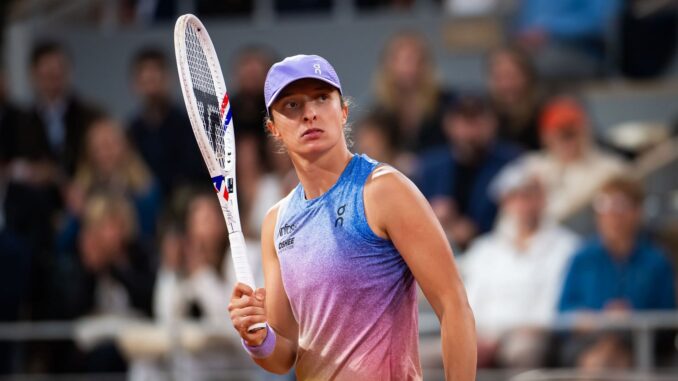
The 2025 French Open was a bittersweet chapter for Iga Swiatek, the Polish tennis phenom who saw her dream of a record fourth consecutive Roland Garros title slip away in a dramatic semifinal loss to World No. 1 Aryna Sabalenka. The defeat, a 7-6(1), 4-6, 6-0 battle, ended Swiatek’s remarkable 26-match winning streak in Paris, leaving her visibly shaken but resolute. “I love playing here, so for sure I’m happy that I was fortunate enough to play so many great tournaments here,” Swiatek reflected post-match, her voice tinged with both pride and disappointment. Now, as the clay dust settles, the 24-year-old is turning her focus to the grass courts, aiming to conquer her least successful surface and build momentum for Wimbledon, which runs from June 30 to July 13, 2025. With a carefully planned schedule and a renewed sense of purpose, Swiatek is poised to make strides on the lawns of the All England Club.
Swiatek’s journey to Wimbledon begins with a deliberate pause. After an exhausting clay season that saw her reach the semifinals in Paris, the World No. 7—having dropped from No. 2 after failing to defend her title—has opted for a brief rest to recharge physically and mentally. “I’m gonna have a few days off for sure,” she confirmed, emphasizing the need to recover from the grueling nine-week stretch that included tournaments in Stuttgart, Madrid, Rome, and Roland Garros. This decision reflects lessons learned from 2024, when she arrived at Wimbledon without grass-court match practice and suffered a third-round loss. Determined to avoid a repeat, Swiatek and her coach, Wim Fissette, have targeted the Bad Homburg Open, a WTA 500 event in Germany from June 23 to 29, as her sole pre-Wimbledon tune-up. “I felt last year that I could adapt quicker,” Swiatek noted, referencing her 2023 Bad Homburg semifinal run, her best grass result to date.
The Bad Homburg Open offers Swiatek a critical opportunity to refine her game on grass, a surface where her 68% win rate at Wimbledon pales in comparison to her dominance on clay. Fissette has stressed the importance of sticking to Swiatek’s signature heavy topspin game rather than chasing the aggressive, flat-hitting style of grass-court specialists. “For sure, our goal is to do better on the faster surfaces,” he said, advocating for a deeper court position to maximize her spin-heavy forehand. Swiatek’s 2023 Wimbledon quarter-final, her career-best at the tournament, showcased her potential, but a shock loss to Yulia Putintseva last year underscored the challenges of adapting to grass’s low bounce and quick pace. “I really want to learn how to play on grass better, and every year is another opportunity,” Swiatek declared, dismissing rumors of skipping Wimbledon with characteristic resolve: “You shouldn’t believe this stuff.”
After Bad Homburg, Swiatek will head to Wimbledon as the likely No. 7 seed, a ranking that could pit her against top players like Sabalenka or Coco Gauff in the quarter-finals. Her 2025 season, while consistent with quarter-final or better finishes in every tournament, has been marked by a title drought since her 2024 Roland Garros triumph. “I might be harsh on myself,” she admitted, reflecting on her high standards. Yet, her resilience shone in Paris, where she battled back from a set down to defeat Elena Rybakina 1-6, 6-3, 7-5 in the fourth round. “It means a lot. I think I needed that kind of win to feel these feelings that I’m able to win under pressure,” she said, a mindset she’ll carry into Wimbledon, where she aims to surpass her 2023 quarter-final run.
Swiatek’s grass-court preparation is also shaped by her broader goals for 2025, including the Paris Olympics at Roland Garros from July 27 to August 4. “Winning any medal would be a dream come true,” she said, mindful of keeping expectations low after the stress of the 2021 Tokyo Games. Her focus on grass, however, takes precedence, with Bad Homburg serving as a proving ground to test tactical adjustments. Fans and analysts alike are eager to see if Swiatek can translate her clay-court dominance—where she’s earned the nickname “Queen of Clay”—to the lawns of Wimbledon, a tournament where she’s yet to reach the semi-finals.
As Swiatek embarks on this pivotal phase, her journey is one of redemption and growth. The French Open loss to Sabalenka, while painful, has fueled her determination to evolve. “Even this one, you know, I feel like I played better than weeks before,” she said, finding silver linings in defeat. With a week of rest, a strategic grass-court warmup, and a burning desire to conquer Wimbledon’s challenges, Swiatek is ready to rewrite her grass-court narrative, one spin-heavy forehand at a time.
Leave a Reply